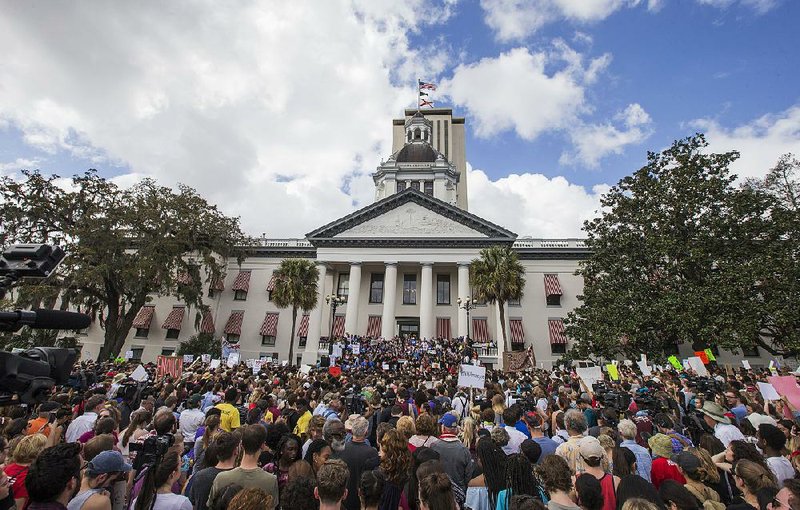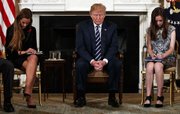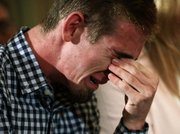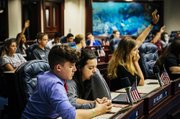TALLAHASSEE, Fla. -- Thousands of Florida high school students and protesters rallied Wednesday at the state Capitol to demand that lawmakers take action in the final weeks of the legislative session to curb the sale of assault-style rifles.
"Thoughts and prayers won't stop my brothers and my sisters from dying -- action will," said Sheryl Acquaroli, 16, a student at Marjory Stoneman Douglas High School, where 17 students and faculty members were killed Feb. 14 in a mass shooting. "They are our students, our teachers and our coaches. And they died because you failed."
The voices of survivors of school shootings also filled the White House on Wednesday as President Donald Trump held a listening session and heard pleas from parents and students for government action to keep children safe.
As lawmakers were condemned on the steps of Florida's Capitol, a bipartisan group in the state House and Senate continued working to hash out a set of bipartisan proposals that could be voted on as early as next week in response to the shooting. In the din of protest, the rigid partisan lines that have long deadlocked the national debate over gun violence have shown signs of cracking.
The proposals under consideration stop short of student demands for a ban on the sale of semi-automatic assault-style weapons like the AR-15 style gun that was used in the most recent shooting. Instead, lawmakers have focused on new waiting period and age restrictions on buyers of semi-automatic rifles, new powers for police to confiscate guns from people deemed dangerous by the courts and new measures to protect schools from mass shooters.
At a news conference Wednesday, Broward County, Fla., Sheriff Scott Israel ordered all deputies who qualify to begin carrying rifles on school grounds. The rifles will be secured in patrol cars when not in use until the agency obtains gun lockers, he said.
"We need to be able to defeat any threat that comes into campus," Israel said, adding that the school superintendent fully supports his decision.
Marjory Stoneman's school resource officer was carrying a weapon when the shooting happened last week, but did not discharge his firearm. It's unclear what role he played in the incident. The sheriff said those details are still being investigated.
Also Wednesday, teens in at least a dozen south Florida schools walked out of class to protest gun violence and commemorate the shooting victims. About 2,000 students, parents, teachers and supporters held hands and chanted outside the Parkland campus.
The suspect, 19-year-old Nikolas Cruz, has been jailed on 17 counts of murder. Defense attorneys, state records and people who knew him indicate that he displayed behavioral troubles for years, including getting kicked out of the Parkland school. He owned a collection of weapons.
"How is it possible that this boy that we all knew was clearly disturbed was able to get an assault rifle, military grade, and come to our school and try to kill us?" one 16-year-old student asked the president of the state Senate, Joe Negron.
Negron, who has received a perfect score from the powerful National Rifle Association for his gun votes, did not answer directly. "That's an issue that we're reviewing," he said.
[PRESIDENT TRUMP: Timeline, appointments, executive orders + guide to actions in first year]
When another lawmaker said he supported raising the age to buy assault-style weapons to 21 from 18, the students broke into applause.
Thus far, the lawmakers' proposals that feature the waiting period and age restrictions represent a sharp break from the state's traditional response to mass-casualty gun violence. Though a contested state in presidential elections, Florida has a long history as a laboratory of gun-rights legislation pushed by the NRA.
The state spearheaded efforts to establish concealed-carry permits and a "stand-your-ground" law, which protects people who use deadly force if they believe they are in imminent danger. Many state leaders, including Republican Gov. Rick Scott, boast high NRA approval ratings.
On Wednesday evening, U.S. Sen. Marco Rubio, a Florida Republican, faced angry students, teachers and parents at a CNN Stand Up town hall-style event.
Fred Guttenberg, whose 14-year-old daughter Jaime was killed in last week's school shooting, challenged Rubio to acknowledge that "guns were the factor in the hunting of our kids."
Rubio responded that the problems laid bare by the shooting rampage "cannot be solved by gun laws alone," drawing jeering whistles from the crowd. Rubio responded that he would support laws barring those 18 and under from buying such weapons, support changing the background checks system and getting rid of bump stocks.
He said that if he believed a ban on assault-style weapons "would have prevented this from happening, I would have supported it."
BLAME FOR NRA
National gun-control groups, including the Brady Campaign to Prevent Gun Violence and a group founded by former Rep. Gabrielle Giffords, D-Ariz., helped organize the rally in Tallahassee, and then led hundreds of students to clog the hallways of the Capitol building in protest afterward.
Before the rally, where a procession of students spoke wearing "We Call B.S." T-shirts, Florida Senate Republican leaders met with a group of about 50 surviving students of the Parkland shooting who had traveled to the state Capitol. One student denounced the NRA as "murderers," several said they had come to "beg" for changes to gun laws, and many broke into tears as they described how their friends were shot.
Many protesters complained that lawmakers were not serious about changes, and they said they would oppose in future elections any legislator who accepts campaign contributions from the NRA.
"We've spoke to only a few legislators and ... the most we've gotten out of them is, 'We'll keep you in our thoughts. You are so strong. You are so powerful,'" said Delaney Tarr, a senior at the high school. "We know what we want. We want gun reform. We want common-sense gun laws. ... We want change."
Florida took no legislative action on guns after an attack on a Orlando nightclub killed 49 people in 2016 or after another rampage in the Fort Lauderdale-Hollywood International Airport that killed five in 2017. In the current legislative session, there have been Republican proposals to allow guns in courthouses and airports, as well as proposals to allow the carrying of handguns without a permit.
The outlines of a possible new agreement emerged last week, in the days immediately after the Parkland shooting, during bipartisan tours of the crime scene at the school. Local Democratic legislators invited the state's Republican leadership to walk the bloodstained halls and hear firsthand from first responders about the attacks.
For some involved in the process, the fact that Democrats now have a seat at the table to discuss gun violence is itself a breakthrough that could have implications outside the state, as the rest of the country grapples with growing concern over gun violence. Trump, a staunch NRA ally, has also begun talking about potential gun-control measures.
Still, on Tuesday, the Republican-dominated Florida House handily defeated a Democratic effort to open debate on a ban on assault-style weapons, as several students watched tearfully from the gallery.
TRUMP VOWS ACTION
Trump listened intently and pledged action Wednesday as students and parents appealed to him to set politics aside and protect America's schoolchildren from gun violence.
A tearful Samuel Zeif, a student at the high school, described waking up "to the news that my best friend was gone. And I don't understand why I can still go in a store and buy a weapon of war. An AR. How is it that easy to buy this type of weapon? How do we not stop this after Columbine? After Sandy Hook?"
Zeif was referring to the 1999 shooting at Columbine High School in Colorado, in which 12 students and one teacher were killed, and to the 2012 slayings of 26 children and adults in Connecticut's Sandy Hook Elementary School.
Trump promised to be "very strong on background checks." And he suggested he supported allowing some teachers and other school employees to carry concealed weapons to be ready for intruders. But largely he listened, holding handwritten notes bearing his message to the families. "I hear you" was written in black marker.
The president, a strong supporter of gun rights, had welcomed the teen survivors of school violence and parents of slain children to the White House, encouraging his guests to offer solutions. Trump did not fully endorse any specific policy solution, but pledged to take action and expressed interest in widely differing approaches.
Besides considering concealed carrying of weapons by trained school employees, a concept he has endorsed in the past, he said he planned to go "very strongly into age, age of purchase." And he said he was committed to improving background checks and working on mental health.
Soon after Trump made those remarks, the NRA rejected any talk of raising the age for buying long guns to 21.
"Legislative proposals that prevent law-abiding adults aged 18-20 years old from acquiring rifles and shotguns effectively prohibits them for purchasing any firearm, thus depriving them of their constitutional right to self-protection," the group said in a statement.
More than 40 people assembled in the White House State Dining Room. Among them were students from Parkland along with their parents. Also present were Darrell and Sandra Scott, whose daughter was killed in the Columbine shooting, and Nicole Hockley and Mark Barden, who lost children at Sandy Hook. Students and parents from the Washington area also were present.
In the U.S. Congress, some lawmakers were busy discussing ways to curb gun violence.
Sens. Dianne Feinstein, D-Calif., and Jeff Flake, R-Ariz., said Wednesday that they would introduce a bill to raise the minimum age required to purchase rifles from gun dealers, including assault-style weapons such as the AR-15.
"A kid too young to buy a handgun should be too young to buy an #AR15," Flake said on Twitter. A buyer must be 21 to purchase a handgun.
Sen. Pat Toomey, R-Pa., said Wednesday that he'll probably reintroduce bipartisan legislation that would require background checks for all gun purchases online and at gun shows. He said he planned to discuss the idea with Trump.
That bill first emerged with backing from Toomey and Sen. Joe Manchin, D-W.Va., after the Sandy Hook shooting. It failed then and at least one more time since.
On Tuesday, Trump directed the Justice Department to move to ban devices like the rapid-fire bump stocks used in last year's Las Vegas massacre. The White House has also said Trump was looking at a bill that would strengthen federal gun background checks.
Information for this article was contributed by Michael Scherer of The Washington Post and by Catherine Lucey, Matthew Daly, Jill Colvin, Sadie Gurman, Marc Levy, Brendan Farrington, Gary Fineout, Tamara Lush, Joe Reedy, Terry Spence, Kelli Kennedy, Freida Frisaro and Alina Hartounian of The Associated Press.
RELATED ARTICLES
http://www.arkansas…">Lawmaker gets earful on reining in firearmshttp://www.arkansas…">Sheriff investigating student's threat finds AR-15 rifles
A Section on 02/22/2018




